Accounting Principles: Financial Statement Analysis and Budgeting
VerifiedAdded on 2023/06/05
|14
|4317
|497
Report
AI Summary
This report provides a comprehensive analysis of accounting principles, focusing on their role in meeting organizational and societal requirements. It includes a critical evaluation of financial statements for partnerships, sole proprietorships, and not-for-profit organizations, using financial ratios and benchmarks to gauge organizational performance. The report also justifies budgetary control measures and their influence on organizational decision-making, discussing the advantages and restrictions of budgets, budgetary planning, and control. Furthermore, it presents a cash budget for Duck Café and justifies budgetary control measures for effective fund positioning. The analysis covers the importance of accounting functions in regulatory and ethical contexts, emphasizing the need for ethical financial reporting and adherence to accounting standards such as GAAP and IFRS. The report uses financial statements of Parcel Portal Ltd to derive and analyze financial ratios like gross profit margin, current ratio, and inventory days to assess the company's financial health and performance.
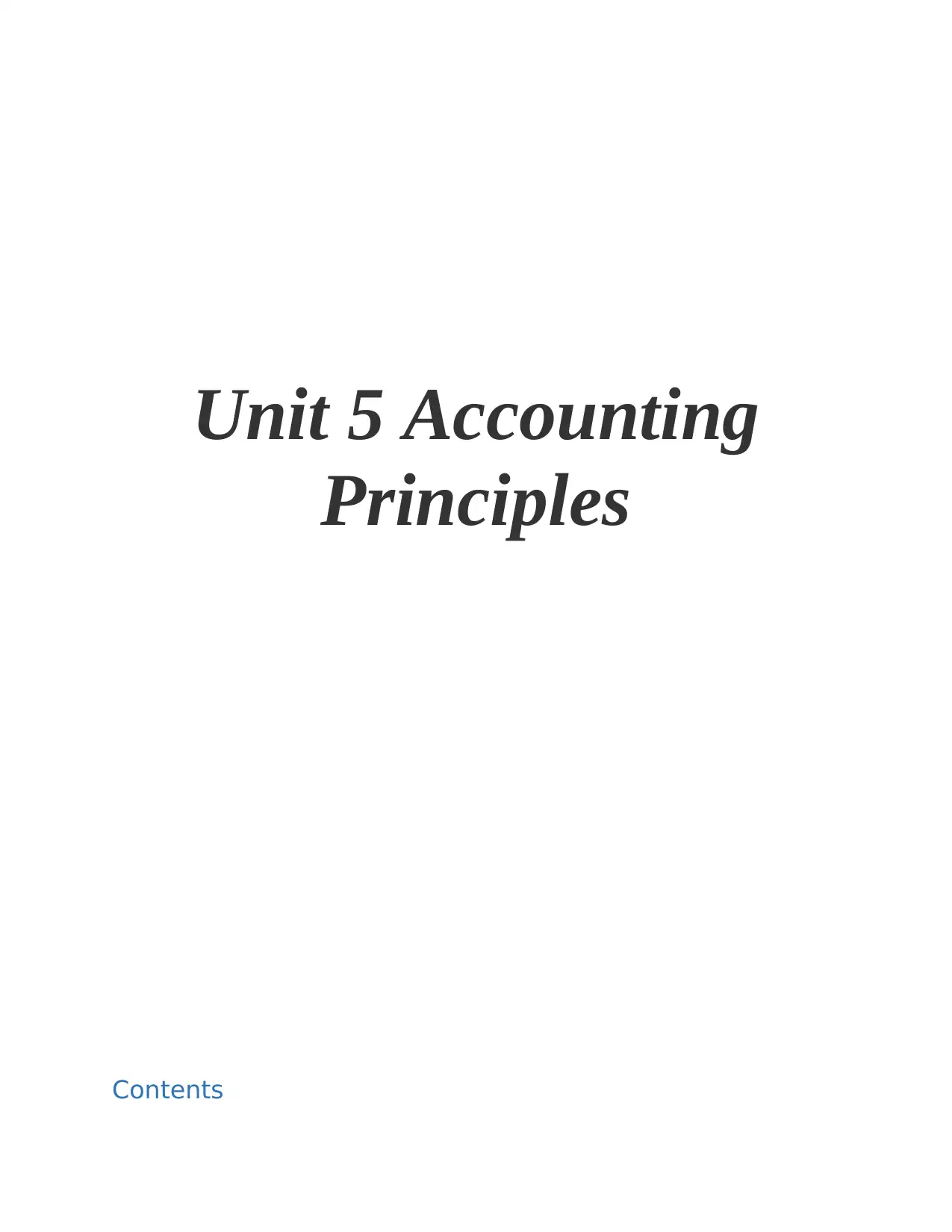
Unit 5 Accounting
Principles
Contents
Principles
Contents
Paraphrase This Document
Need a fresh take? Get an instant paraphrase of this document with our AI Paraphraser
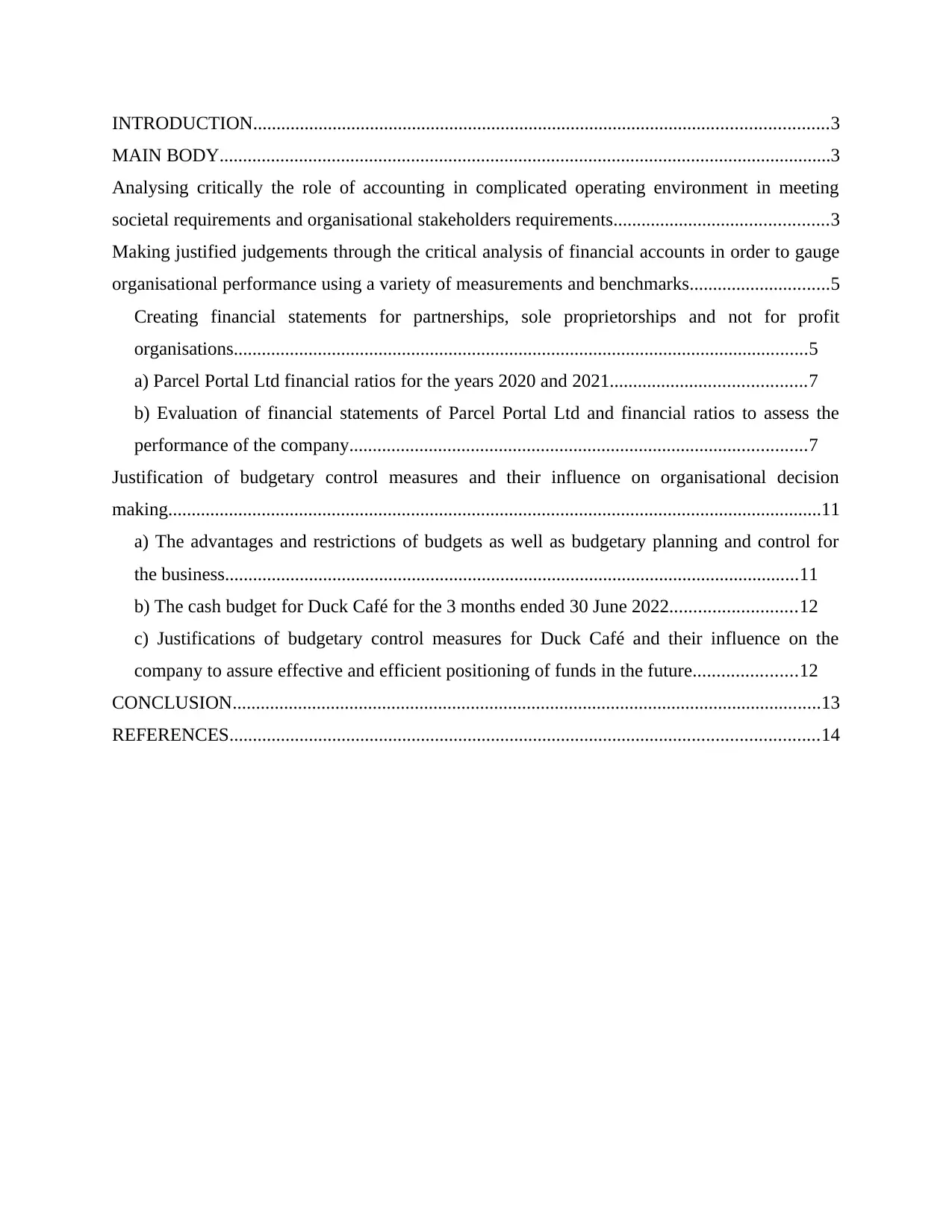
INTRODUCTION...........................................................................................................................3
MAIN BODY...................................................................................................................................3
Analysing critically the role of accounting in complicated operating environment in meeting
societal requirements and organisational stakeholders requirements..............................................3
Making justified judgements through the critical analysis of financial accounts in order to gauge
organisational performance using a variety of measurements and benchmarks..............................5
Creating financial statements for partnerships, sole proprietorships and not for profit
organisations...........................................................................................................................5
a) Parcel Portal Ltd financial ratios for the years 2020 and 2021..........................................7
b) Evaluation of financial statements of Parcel Portal Ltd and financial ratios to assess the
performance of the company..................................................................................................7
Justification of budgetary control measures and their influence on organisational decision
making............................................................................................................................................11
a) The advantages and restrictions of budgets as well as budgetary planning and control for
the business...........................................................................................................................11
b) The cash budget for Duck Café for the 3 months ended 30 June 2022...........................12
c) Justifications of budgetary control measures for Duck Café and their influence on the
company to assure effective and efficient positioning of funds in the future......................12
CONCLUSION..............................................................................................................................13
REFERENCES..............................................................................................................................14
MAIN BODY...................................................................................................................................3
Analysing critically the role of accounting in complicated operating environment in meeting
societal requirements and organisational stakeholders requirements..............................................3
Making justified judgements through the critical analysis of financial accounts in order to gauge
organisational performance using a variety of measurements and benchmarks..............................5
Creating financial statements for partnerships, sole proprietorships and not for profit
organisations...........................................................................................................................5
a) Parcel Portal Ltd financial ratios for the years 2020 and 2021..........................................7
b) Evaluation of financial statements of Parcel Portal Ltd and financial ratios to assess the
performance of the company..................................................................................................7
Justification of budgetary control measures and their influence on organisational decision
making............................................................................................................................................11
a) The advantages and restrictions of budgets as well as budgetary planning and control for
the business...........................................................................................................................11
b) The cash budget for Duck Café for the 3 months ended 30 June 2022...........................12
c) Justifications of budgetary control measures for Duck Café and their influence on the
company to assure effective and efficient positioning of funds in the future......................12
CONCLUSION..............................................................................................................................13
REFERENCES..............................................................................................................................14
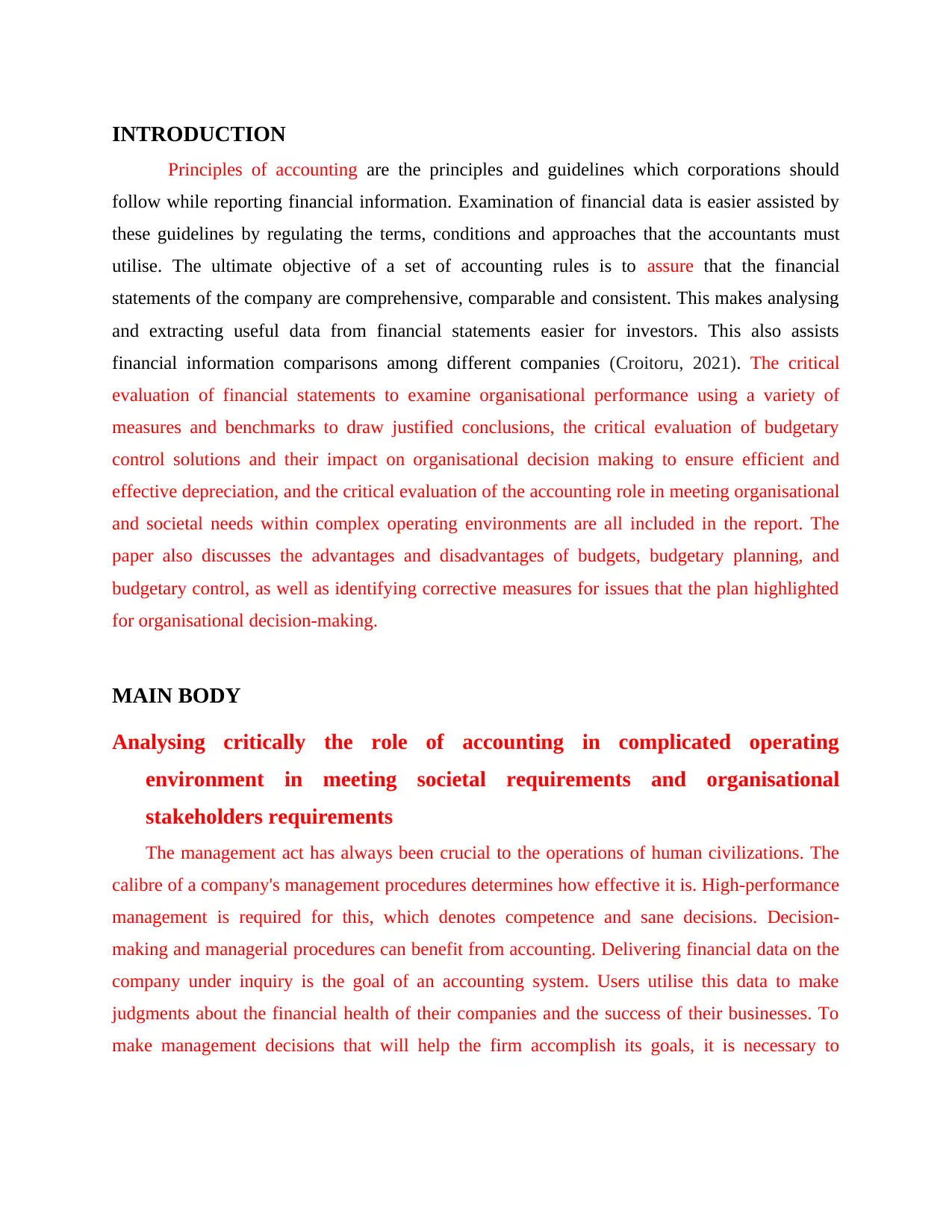
INTRODUCTION
Principles of accounting are the principles and guidelines which corporations should
follow while reporting financial information. Examination of financial data is easier assisted by
these guidelines by regulating the terms, conditions and approaches that the accountants must
utilise. The ultimate objective of a set of accounting rules is to assure that the financial
statements of the company are comprehensive, comparable and consistent. This makes analysing
and extracting useful data from financial statements easier for investors. This also assists
financial information comparisons among different companies (Croitoru, 2021). The critical
evaluation of financial statements to examine organisational performance using a variety of
measures and benchmarks to draw justified conclusions, the critical evaluation of budgetary
control solutions and their impact on organisational decision making to ensure efficient and
effective depreciation, and the critical evaluation of the accounting role in meeting organisational
and societal needs within complex operating environments are all included in the report. The
paper also discusses the advantages and disadvantages of budgets, budgetary planning, and
budgetary control, as well as identifying corrective measures for issues that the plan highlighted
for organisational decision-making.
MAIN BODY
Analysing critically the role of accounting in complicated operating
environment in meeting societal requirements and organisational
stakeholders requirements
The management act has always been crucial to the operations of human civilizations. The
calibre of a company's management procedures determines how effective it is. High-performance
management is required for this, which denotes competence and sane decisions. Decision-
making and managerial procedures can benefit from accounting. Delivering financial data on the
company under inquiry is the goal of an accounting system. Users utilise this data to make
judgments about the financial health of their companies and the success of their businesses. To
make management decisions that will help the firm accomplish its goals, it is necessary to
Principles of accounting are the principles and guidelines which corporations should
follow while reporting financial information. Examination of financial data is easier assisted by
these guidelines by regulating the terms, conditions and approaches that the accountants must
utilise. The ultimate objective of a set of accounting rules is to assure that the financial
statements of the company are comprehensive, comparable and consistent. This makes analysing
and extracting useful data from financial statements easier for investors. This also assists
financial information comparisons among different companies (Croitoru, 2021). The critical
evaluation of financial statements to examine organisational performance using a variety of
measures and benchmarks to draw justified conclusions, the critical evaluation of budgetary
control solutions and their impact on organisational decision making to ensure efficient and
effective depreciation, and the critical evaluation of the accounting role in meeting organisational
and societal needs within complex operating environments are all included in the report. The
paper also discusses the advantages and disadvantages of budgets, budgetary planning, and
budgetary control, as well as identifying corrective measures for issues that the plan highlighted
for organisational decision-making.
MAIN BODY
Analysing critically the role of accounting in complicated operating
environment in meeting societal requirements and organisational
stakeholders requirements
The management act has always been crucial to the operations of human civilizations. The
calibre of a company's management procedures determines how effective it is. High-performance
management is required for this, which denotes competence and sane decisions. Decision-
making and managerial procedures can benefit from accounting. Delivering financial data on the
company under inquiry is the goal of an accounting system. Users utilise this data to make
judgments about the financial health of their companies and the success of their businesses. To
make management decisions that will help the firm accomplish its goals, it is necessary to
⊘ This is a preview!⊘
Do you want full access?
Subscribe today to unlock all pages.

Trusted by 1+ million students worldwide
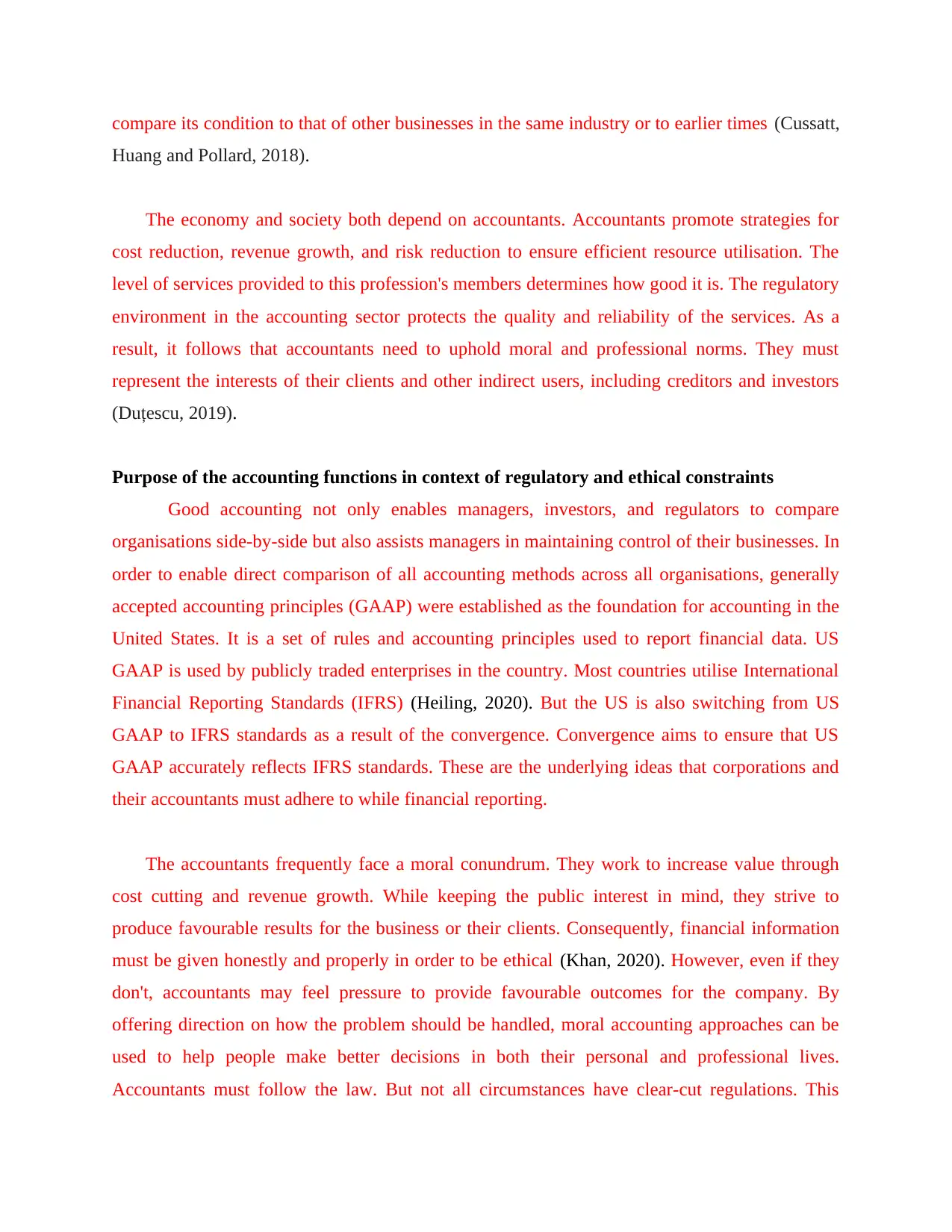
compare its condition to that of other businesses in the same industry or to earlier times (Cussatt,
Huang and Pollard, 2018).
The economy and society both depend on accountants. Accountants promote strategies for
cost reduction, revenue growth, and risk reduction to ensure efficient resource utilisation. The
level of services provided to this profession's members determines how good it is. The regulatory
environment in the accounting sector protects the quality and reliability of the services. As a
result, it follows that accountants need to uphold moral and professional norms. They must
represent the interests of their clients and other indirect users, including creditors and investors
(Duțescu, 2019).
Purpose of the accounting functions in context of regulatory and ethical constraints
Good accounting not only enables managers, investors, and regulators to compare
organisations side-by-side but also assists managers in maintaining control of their businesses. In
order to enable direct comparison of all accounting methods across all organisations, generally
accepted accounting principles (GAAP) were established as the foundation for accounting in the
United States. It is a set of rules and accounting principles used to report financial data. US
GAAP is used by publicly traded enterprises in the country. Most countries utilise International
Financial Reporting Standards (IFRS) (Heiling, 2020). But the US is also switching from US
GAAP to IFRS standards as a result of the convergence. Convergence aims to ensure that US
GAAP accurately reflects IFRS standards. These are the underlying ideas that corporations and
their accountants must adhere to while financial reporting.
The accountants frequently face a moral conundrum. They work to increase value through
cost cutting and revenue growth. While keeping the public interest in mind, they strive to
produce favourable results for the business or their clients. Consequently, financial information
must be given honestly and properly in order to be ethical (Khan, 2020). However, even if they
don't, accountants may feel pressure to provide favourable outcomes for the company. By
offering direction on how the problem should be handled, moral accounting approaches can be
used to help people make better decisions in both their personal and professional lives.
Accountants must follow the law. But not all circumstances have clear-cut regulations. This
Huang and Pollard, 2018).
The economy and society both depend on accountants. Accountants promote strategies for
cost reduction, revenue growth, and risk reduction to ensure efficient resource utilisation. The
level of services provided to this profession's members determines how good it is. The regulatory
environment in the accounting sector protects the quality and reliability of the services. As a
result, it follows that accountants need to uphold moral and professional norms. They must
represent the interests of their clients and other indirect users, including creditors and investors
(Duțescu, 2019).
Purpose of the accounting functions in context of regulatory and ethical constraints
Good accounting not only enables managers, investors, and regulators to compare
organisations side-by-side but also assists managers in maintaining control of their businesses. In
order to enable direct comparison of all accounting methods across all organisations, generally
accepted accounting principles (GAAP) were established as the foundation for accounting in the
United States. It is a set of rules and accounting principles used to report financial data. US
GAAP is used by publicly traded enterprises in the country. Most countries utilise International
Financial Reporting Standards (IFRS) (Heiling, 2020). But the US is also switching from US
GAAP to IFRS standards as a result of the convergence. Convergence aims to ensure that US
GAAP accurately reflects IFRS standards. These are the underlying ideas that corporations and
their accountants must adhere to while financial reporting.
The accountants frequently face a moral conundrum. They work to increase value through
cost cutting and revenue growth. While keeping the public interest in mind, they strive to
produce favourable results for the business or their clients. Consequently, financial information
must be given honestly and properly in order to be ethical (Khan, 2020). However, even if they
don't, accountants may feel pressure to provide favourable outcomes for the company. By
offering direction on how the problem should be handled, moral accounting approaches can be
used to help people make better decisions in both their personal and professional lives.
Accountants must follow the law. But not all circumstances have clear-cut regulations. This
Paraphrase This Document
Need a fresh take? Get an instant paraphrase of this document with our AI Paraphraser
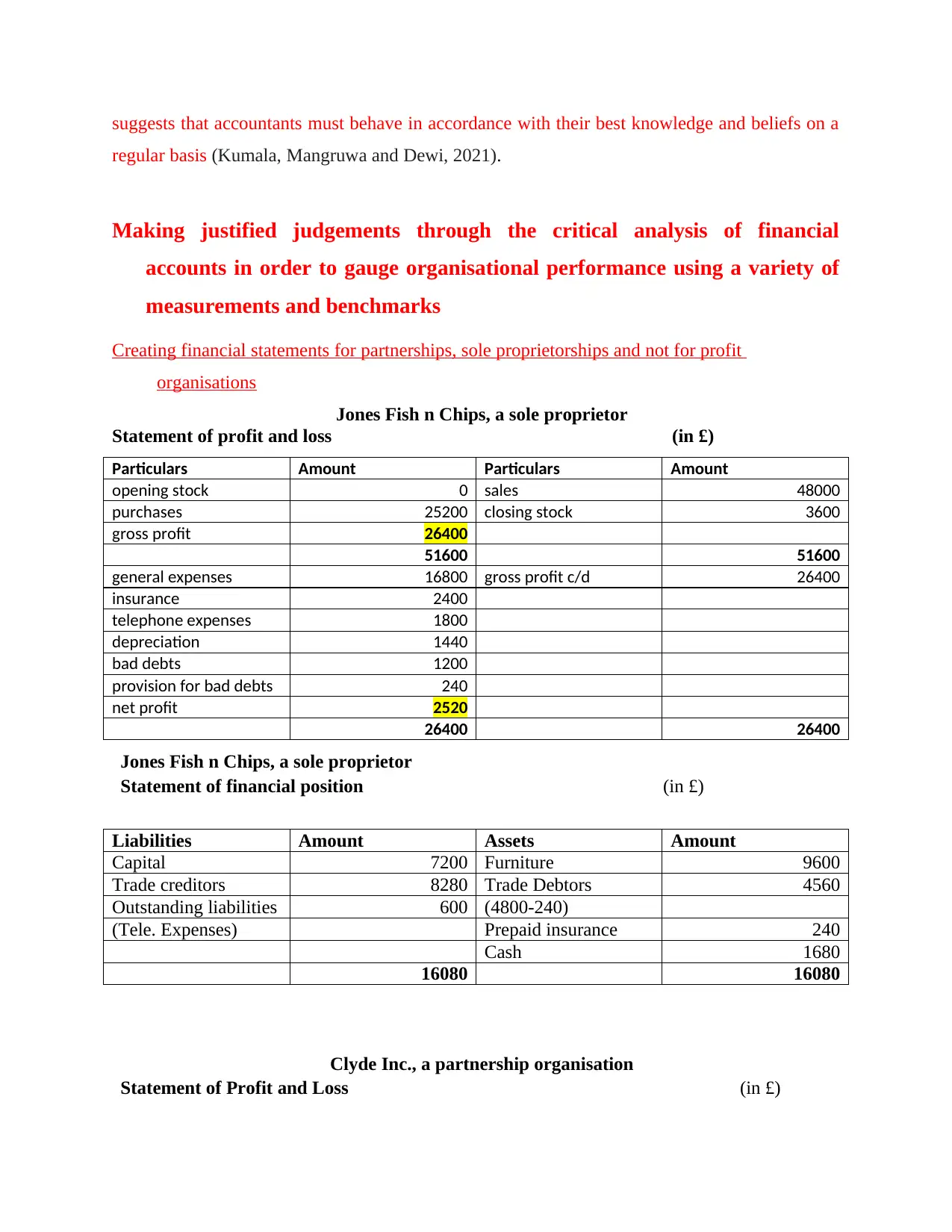
suggests that accountants must behave in accordance with their best knowledge and beliefs on a
regular basis (Kumala, Mangruwa and Dewi, 2021).
Making justified judgements through the critical analysis of financial
accounts in order to gauge organisational performance using a variety of
measurements and benchmarks
Creating financial statements for partnerships, sole proprietorships and not for profit
organisations
Jones Fish n Chips, a sole proprietor
Statement of profit and loss (in £)
Particulars Amount Particulars Amount
opening stock 0 sales 48000
purchases 25200 closing stock 3600
gross profit 26400
51600 51600
general expenses 16800 gross profit c/d 26400
insurance 2400
telephone expenses 1800
depreciation 1440
bad debts 1200
provision for bad debts 240
net profit 2520
26400 26400
Jones Fish n Chips, a sole proprietor
Statement of financial position (in £)
Liabilities Amount Assets Amount
Capital 7200 Furniture 9600
Trade creditors 8280 Trade Debtors 4560
Outstanding liabilities 600 (4800-240)
(Tele. Expenses) Prepaid insurance 240
Cash 1680
16080 16080
Clyde Inc., a partnership organisation
Statement of Profit and Loss (in £)
regular basis (Kumala, Mangruwa and Dewi, 2021).
Making justified judgements through the critical analysis of financial
accounts in order to gauge organisational performance using a variety of
measurements and benchmarks
Creating financial statements for partnerships, sole proprietorships and not for profit
organisations
Jones Fish n Chips, a sole proprietor
Statement of profit and loss (in £)
Particulars Amount Particulars Amount
opening stock 0 sales 48000
purchases 25200 closing stock 3600
gross profit 26400
51600 51600
general expenses 16800 gross profit c/d 26400
insurance 2400
telephone expenses 1800
depreciation 1440
bad debts 1200
provision for bad debts 240
net profit 2520
26400 26400
Jones Fish n Chips, a sole proprietor
Statement of financial position (in £)
Liabilities Amount Assets Amount
Capital 7200 Furniture 9600
Trade creditors 8280 Trade Debtors 4560
Outstanding liabilities 600 (4800-240)
(Tele. Expenses) Prepaid insurance 240
Cash 1680
16080 16080
Clyde Inc., a partnership organisation
Statement of Profit and Loss (in £)
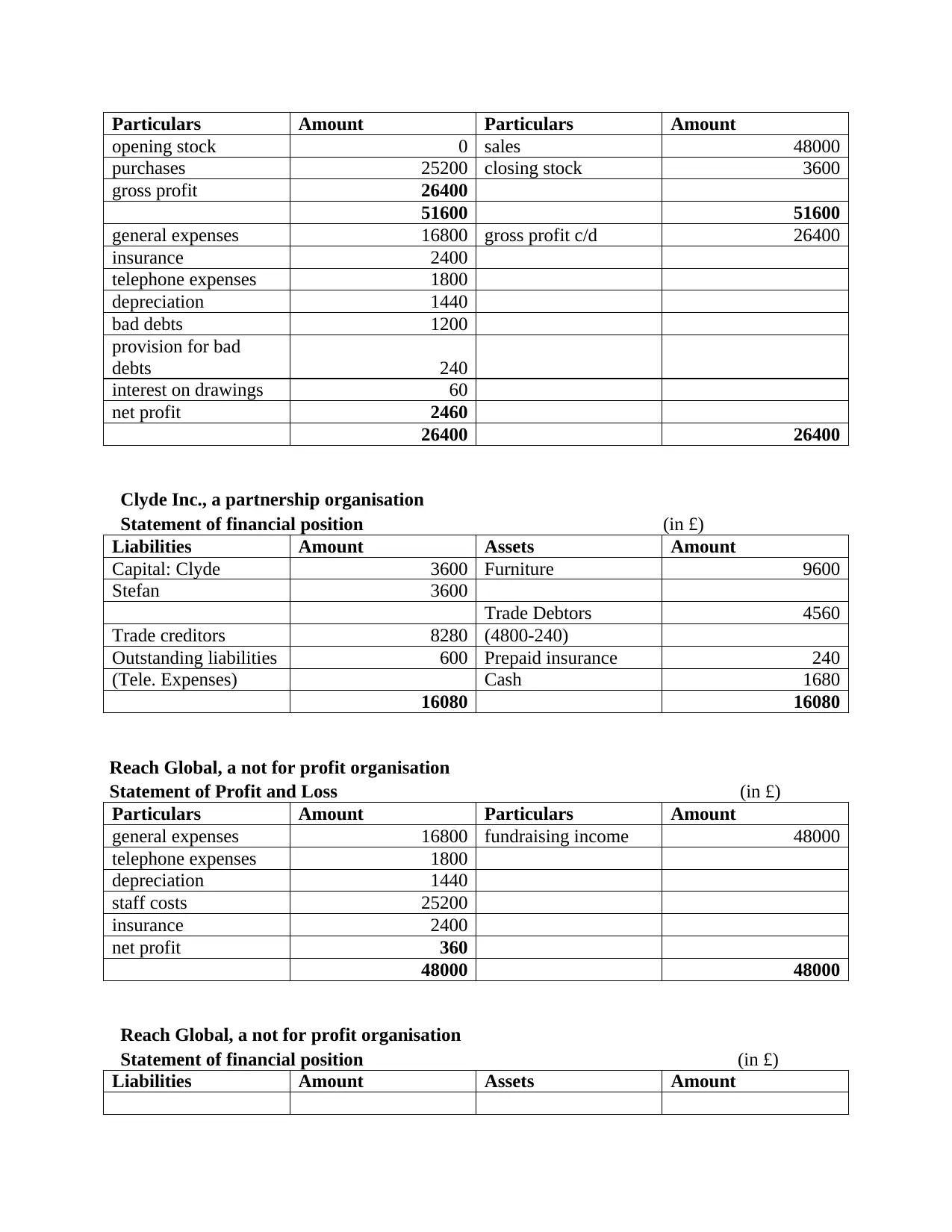
Particulars Amount Particulars Amount
opening stock 0 sales 48000
purchases 25200 closing stock 3600
gross profit 26400
51600 51600
general expenses 16800 gross profit c/d 26400
insurance 2400
telephone expenses 1800
depreciation 1440
bad debts 1200
provision for bad
debts 240
interest on drawings 60
net profit 2460
26400 26400
Clyde Inc., a partnership organisation
Statement of financial position (in £)
Liabilities Amount Assets Amount
Capital: Clyde 3600 Furniture 9600
Stefan 3600
Trade Debtors 4560
Trade creditors 8280 (4800-240)
Outstanding liabilities 600 Prepaid insurance 240
(Tele. Expenses) Cash 1680
16080 16080
Reach Global, a not for profit organisation
Statement of Profit and Loss (in £)
Particulars Amount Particulars Amount
general expenses 16800 fundraising income 48000
telephone expenses 1800
depreciation 1440
staff costs 25200
insurance 2400
net profit 360
48000 48000
Reach Global, a not for profit organisation
Statement of financial position (in £)
Liabilities Amount Assets Amount
opening stock 0 sales 48000
purchases 25200 closing stock 3600
gross profit 26400
51600 51600
general expenses 16800 gross profit c/d 26400
insurance 2400
telephone expenses 1800
depreciation 1440
bad debts 1200
provision for bad
debts 240
interest on drawings 60
net profit 2460
26400 26400
Clyde Inc., a partnership organisation
Statement of financial position (in £)
Liabilities Amount Assets Amount
Capital: Clyde 3600 Furniture 9600
Stefan 3600
Trade Debtors 4560
Trade creditors 8280 (4800-240)
Outstanding liabilities 600 Prepaid insurance 240
(Tele. Expenses) Cash 1680
16080 16080
Reach Global, a not for profit organisation
Statement of Profit and Loss (in £)
Particulars Amount Particulars Amount
general expenses 16800 fundraising income 48000
telephone expenses 1800
depreciation 1440
staff costs 25200
insurance 2400
net profit 360
48000 48000
Reach Global, a not for profit organisation
Statement of financial position (in £)
Liabilities Amount Assets Amount
⊘ This is a preview!⊘
Do you want full access?
Subscribe today to unlock all pages.

Trusted by 1+ million students worldwide
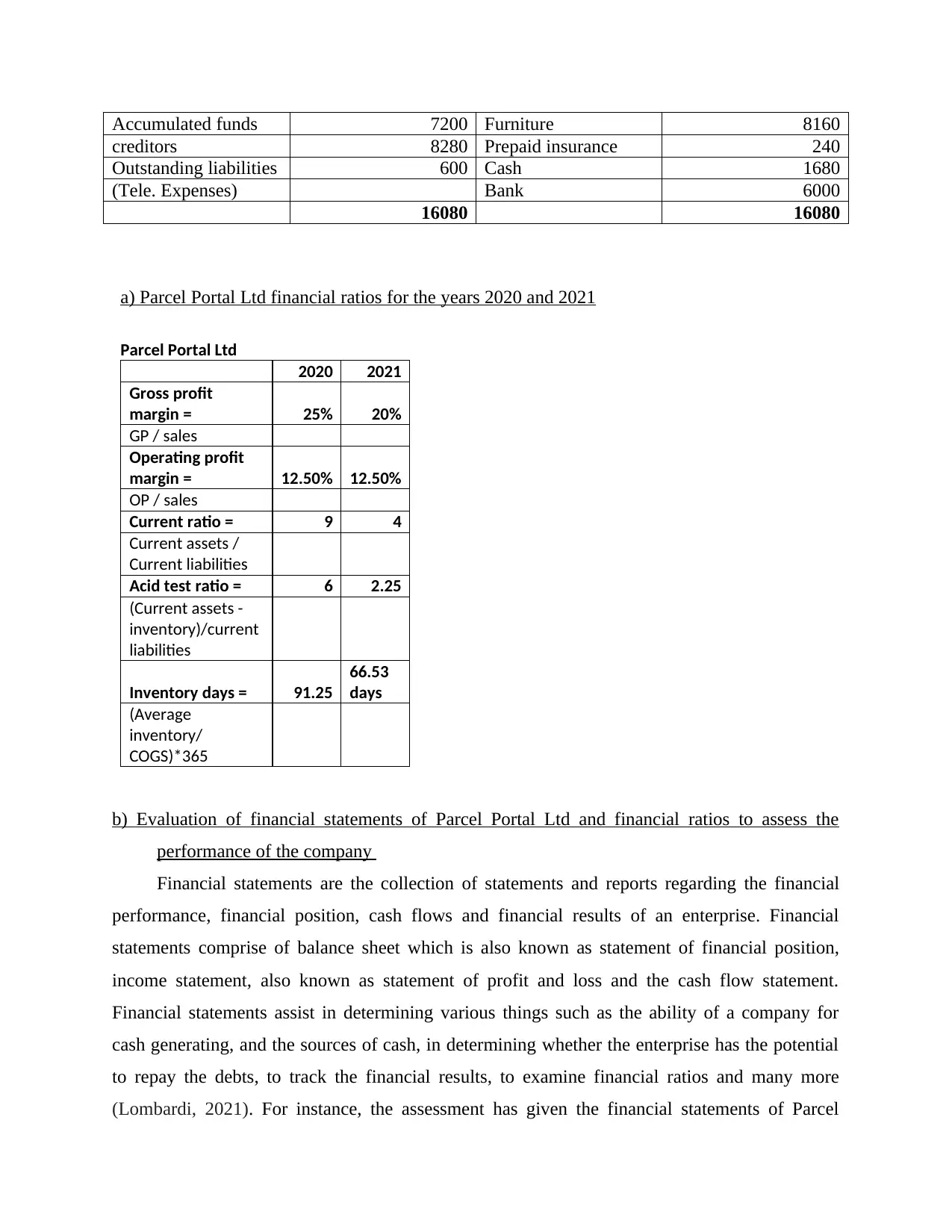
Accumulated funds 7200 Furniture 8160
creditors 8280 Prepaid insurance 240
Outstanding liabilities 600 Cash 1680
(Tele. Expenses) Bank 6000
16080 16080
a) Parcel Portal Ltd financial ratios for the years 2020 and 2021
Parcel Portal Ltd
2020 2021
Gross profit
margin = 25% 20%
GP / sales
Operating profit
margin = 12.50% 12.50%
OP / sales
Current ratio = 9 4
Current assets /
Current liabilities
Acid test ratio = 6 2.25
(Current assets -
inventory)/current
liabilities
Inventory days = 91.25
66.53
days
(Average
inventory/
COGS)*365
b) Evaluation of financial statements of Parcel Portal Ltd and financial ratios to assess the
performance of the company
Financial statements are the collection of statements and reports regarding the financial
performance, financial position, cash flows and financial results of an enterprise. Financial
statements comprise of balance sheet which is also known as statement of financial position,
income statement, also known as statement of profit and loss and the cash flow statement.
Financial statements assist in determining various things such as the ability of a company for
cash generating, and the sources of cash, in determining whether the enterprise has the potential
to repay the debts, to track the financial results, to examine financial ratios and many more
(Lombardi, 2021). For instance, the assessment has given the financial statements of Parcel
creditors 8280 Prepaid insurance 240
Outstanding liabilities 600 Cash 1680
(Tele. Expenses) Bank 6000
16080 16080
a) Parcel Portal Ltd financial ratios for the years 2020 and 2021
Parcel Portal Ltd
2020 2021
Gross profit
margin = 25% 20%
GP / sales
Operating profit
margin = 12.50% 12.50%
OP / sales
Current ratio = 9 4
Current assets /
Current liabilities
Acid test ratio = 6 2.25
(Current assets -
inventory)/current
liabilities
Inventory days = 91.25
66.53
days
(Average
inventory/
COGS)*365
b) Evaluation of financial statements of Parcel Portal Ltd and financial ratios to assess the
performance of the company
Financial statements are the collection of statements and reports regarding the financial
performance, financial position, cash flows and financial results of an enterprise. Financial
statements comprise of balance sheet which is also known as statement of financial position,
income statement, also known as statement of profit and loss and the cash flow statement.
Financial statements assist in determining various things such as the ability of a company for
cash generating, and the sources of cash, in determining whether the enterprise has the potential
to repay the debts, to track the financial results, to examine financial ratios and many more
(Lombardi, 2021). For instance, the assessment has given the financial statements of Parcel
Paraphrase This Document
Need a fresh take? Get an instant paraphrase of this document with our AI Paraphraser
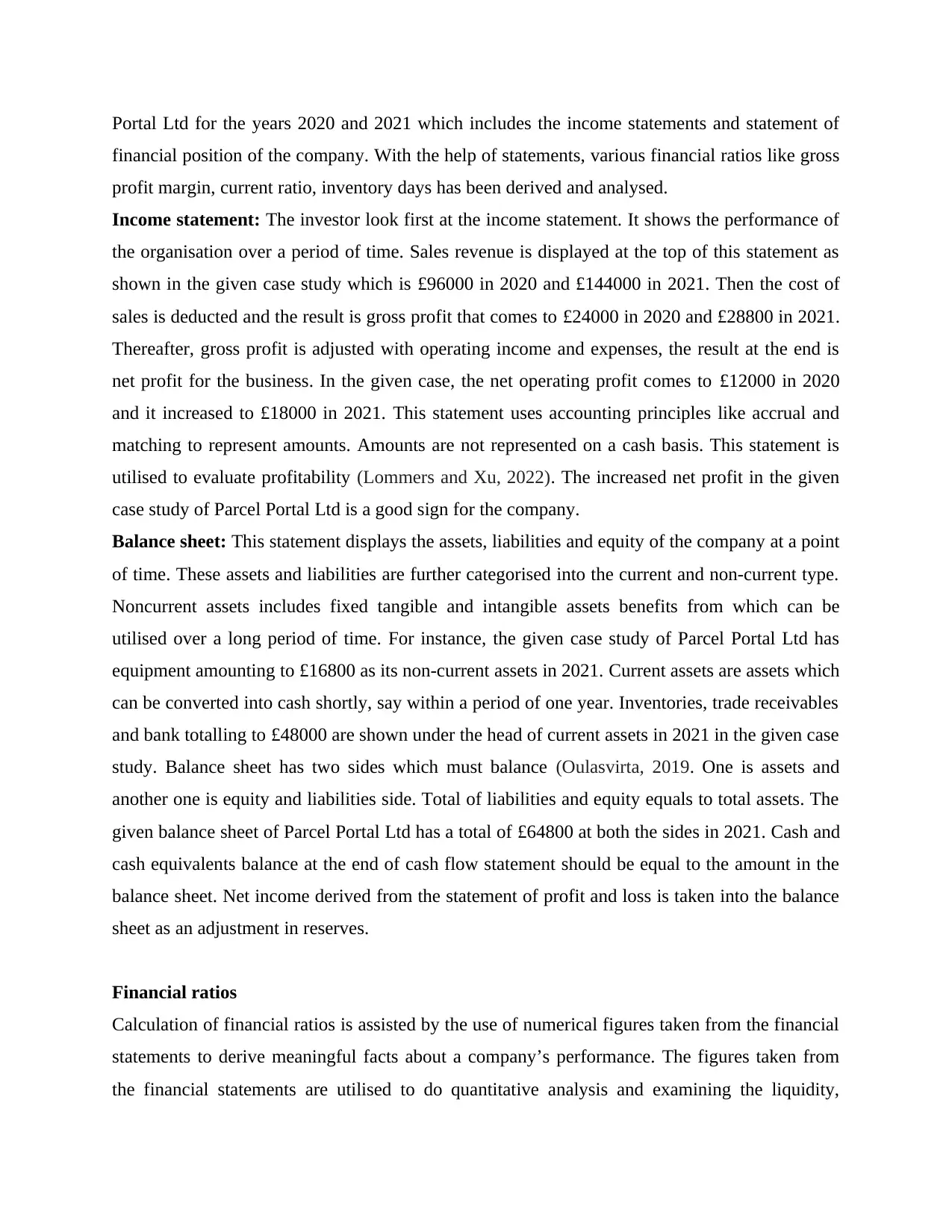
Portal Ltd for the years 2020 and 2021 which includes the income statements and statement of
financial position of the company. With the help of statements, various financial ratios like gross
profit margin, current ratio, inventory days has been derived and analysed.
Income statement: The investor look first at the income statement. It shows the performance of
the organisation over a period of time. Sales revenue is displayed at the top of this statement as
shown in the given case study which is £96000 in 2020 and £144000 in 2021. Then the cost of
sales is deducted and the result is gross profit that comes to £24000 in 2020 and £28800 in 2021.
Thereafter, gross profit is adjusted with operating income and expenses, the result at the end is
net profit for the business. In the given case, the net operating profit comes to £12000 in 2020
and it increased to £18000 in 2021. This statement uses accounting principles like accrual and
matching to represent amounts. Amounts are not represented on a cash basis. This statement is
utilised to evaluate profitability (Lommers and Xu, 2022). The increased net profit in the given
case study of Parcel Portal Ltd is a good sign for the company.
Balance sheet: This statement displays the assets, liabilities and equity of the company at a point
of time. These assets and liabilities are further categorised into the current and non-current type.
Noncurrent assets includes fixed tangible and intangible assets benefits from which can be
utilised over a long period of time. For instance, the given case study of Parcel Portal Ltd has
equipment amounting to £16800 as its non-current assets in 2021. Current assets are assets which
can be converted into cash shortly, say within a period of one year. Inventories, trade receivables
and bank totalling to £48000 are shown under the head of current assets in 2021 in the given case
study. Balance sheet has two sides which must balance (Oulasvirta, 2019. One is assets and
another one is equity and liabilities side. Total of liabilities and equity equals to total assets. The
given balance sheet of Parcel Portal Ltd has a total of £64800 at both the sides in 2021. Cash and
cash equivalents balance at the end of cash flow statement should be equal to the amount in the
balance sheet. Net income derived from the statement of profit and loss is taken into the balance
sheet as an adjustment in reserves.
Financial ratios
Calculation of financial ratios is assisted by the use of numerical figures taken from the financial
statements to derive meaningful facts about a company’s performance. The figures taken from
the financial statements are utilised to do quantitative analysis and examining the liquidity,
financial position of the company. With the help of statements, various financial ratios like gross
profit margin, current ratio, inventory days has been derived and analysed.
Income statement: The investor look first at the income statement. It shows the performance of
the organisation over a period of time. Sales revenue is displayed at the top of this statement as
shown in the given case study which is £96000 in 2020 and £144000 in 2021. Then the cost of
sales is deducted and the result is gross profit that comes to £24000 in 2020 and £28800 in 2021.
Thereafter, gross profit is adjusted with operating income and expenses, the result at the end is
net profit for the business. In the given case, the net operating profit comes to £12000 in 2020
and it increased to £18000 in 2021. This statement uses accounting principles like accrual and
matching to represent amounts. Amounts are not represented on a cash basis. This statement is
utilised to evaluate profitability (Lommers and Xu, 2022). The increased net profit in the given
case study of Parcel Portal Ltd is a good sign for the company.
Balance sheet: This statement displays the assets, liabilities and equity of the company at a point
of time. These assets and liabilities are further categorised into the current and non-current type.
Noncurrent assets includes fixed tangible and intangible assets benefits from which can be
utilised over a long period of time. For instance, the given case study of Parcel Portal Ltd has
equipment amounting to £16800 as its non-current assets in 2021. Current assets are assets which
can be converted into cash shortly, say within a period of one year. Inventories, trade receivables
and bank totalling to £48000 are shown under the head of current assets in 2021 in the given case
study. Balance sheet has two sides which must balance (Oulasvirta, 2019. One is assets and
another one is equity and liabilities side. Total of liabilities and equity equals to total assets. The
given balance sheet of Parcel Portal Ltd has a total of £64800 at both the sides in 2021. Cash and
cash equivalents balance at the end of cash flow statement should be equal to the amount in the
balance sheet. Net income derived from the statement of profit and loss is taken into the balance
sheet as an adjustment in reserves.
Financial ratios
Calculation of financial ratios is assisted by the use of numerical figures taken from the financial
statements to derive meaningful facts about a company’s performance. The figures taken from
the financial statements are utilised to do quantitative analysis and examining the liquidity,
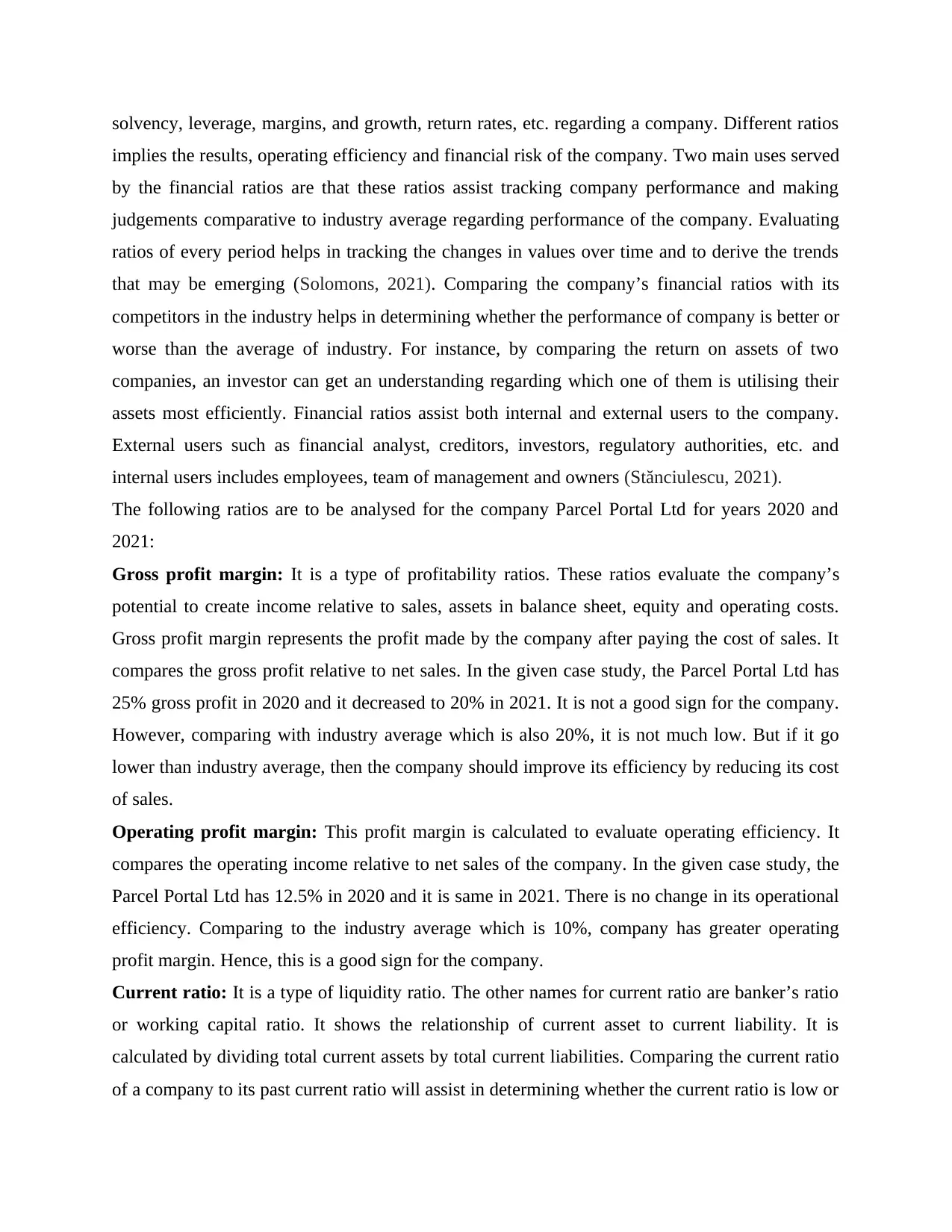
solvency, leverage, margins, and growth, return rates, etc. regarding a company. Different ratios
implies the results, operating efficiency and financial risk of the company. Two main uses served
by the financial ratios are that these ratios assist tracking company performance and making
judgements comparative to industry average regarding performance of the company. Evaluating
ratios of every period helps in tracking the changes in values over time and to derive the trends
that may be emerging (Solomons, 2021). Comparing the company’s financial ratios with its
competitors in the industry helps in determining whether the performance of company is better or
worse than the average of industry. For instance, by comparing the return on assets of two
companies, an investor can get an understanding regarding which one of them is utilising their
assets most efficiently. Financial ratios assist both internal and external users to the company.
External users such as financial analyst, creditors, investors, regulatory authorities, etc. and
internal users includes employees, team of management and owners (Stănciulescu, 2021).
The following ratios are to be analysed for the company Parcel Portal Ltd for years 2020 and
2021:
Gross profit margin: It is a type of profitability ratios. These ratios evaluate the company’s
potential to create income relative to sales, assets in balance sheet, equity and operating costs.
Gross profit margin represents the profit made by the company after paying the cost of sales. It
compares the gross profit relative to net sales. In the given case study, the Parcel Portal Ltd has
25% gross profit in 2020 and it decreased to 20% in 2021. It is not a good sign for the company.
However, comparing with industry average which is also 20%, it is not much low. But if it go
lower than industry average, then the company should improve its efficiency by reducing its cost
of sales.
Operating profit margin: This profit margin is calculated to evaluate operating efficiency. It
compares the operating income relative to net sales of the company. In the given case study, the
Parcel Portal Ltd has 12.5% in 2020 and it is same in 2021. There is no change in its operational
efficiency. Comparing to the industry average which is 10%, company has greater operating
profit margin. Hence, this is a good sign for the company.
Current ratio: It is a type of liquidity ratio. The other names for current ratio are banker’s ratio
or working capital ratio. It shows the relationship of current asset to current liability. It is
calculated by dividing total current assets by total current liabilities. Comparing the current ratio
of a company to its past current ratio will assist in determining whether the current ratio is low or
implies the results, operating efficiency and financial risk of the company. Two main uses served
by the financial ratios are that these ratios assist tracking company performance and making
judgements comparative to industry average regarding performance of the company. Evaluating
ratios of every period helps in tracking the changes in values over time and to derive the trends
that may be emerging (Solomons, 2021). Comparing the company’s financial ratios with its
competitors in the industry helps in determining whether the performance of company is better or
worse than the average of industry. For instance, by comparing the return on assets of two
companies, an investor can get an understanding regarding which one of them is utilising their
assets most efficiently. Financial ratios assist both internal and external users to the company.
External users such as financial analyst, creditors, investors, regulatory authorities, etc. and
internal users includes employees, team of management and owners (Stănciulescu, 2021).
The following ratios are to be analysed for the company Parcel Portal Ltd for years 2020 and
2021:
Gross profit margin: It is a type of profitability ratios. These ratios evaluate the company’s
potential to create income relative to sales, assets in balance sheet, equity and operating costs.
Gross profit margin represents the profit made by the company after paying the cost of sales. It
compares the gross profit relative to net sales. In the given case study, the Parcel Portal Ltd has
25% gross profit in 2020 and it decreased to 20% in 2021. It is not a good sign for the company.
However, comparing with industry average which is also 20%, it is not much low. But if it go
lower than industry average, then the company should improve its efficiency by reducing its cost
of sales.
Operating profit margin: This profit margin is calculated to evaluate operating efficiency. It
compares the operating income relative to net sales of the company. In the given case study, the
Parcel Portal Ltd has 12.5% in 2020 and it is same in 2021. There is no change in its operational
efficiency. Comparing to the industry average which is 10%, company has greater operating
profit margin. Hence, this is a good sign for the company.
Current ratio: It is a type of liquidity ratio. The other names for current ratio are banker’s ratio
or working capital ratio. It shows the relationship of current asset to current liability. It is
calculated by dividing total current assets by total current liabilities. Comparing the current ratio
of a company to its past current ratio will assist in determining whether the current ratio is low or
⊘ This is a preview!⊘
Do you want full access?
Subscribe today to unlock all pages.

Trusted by 1+ million students worldwide
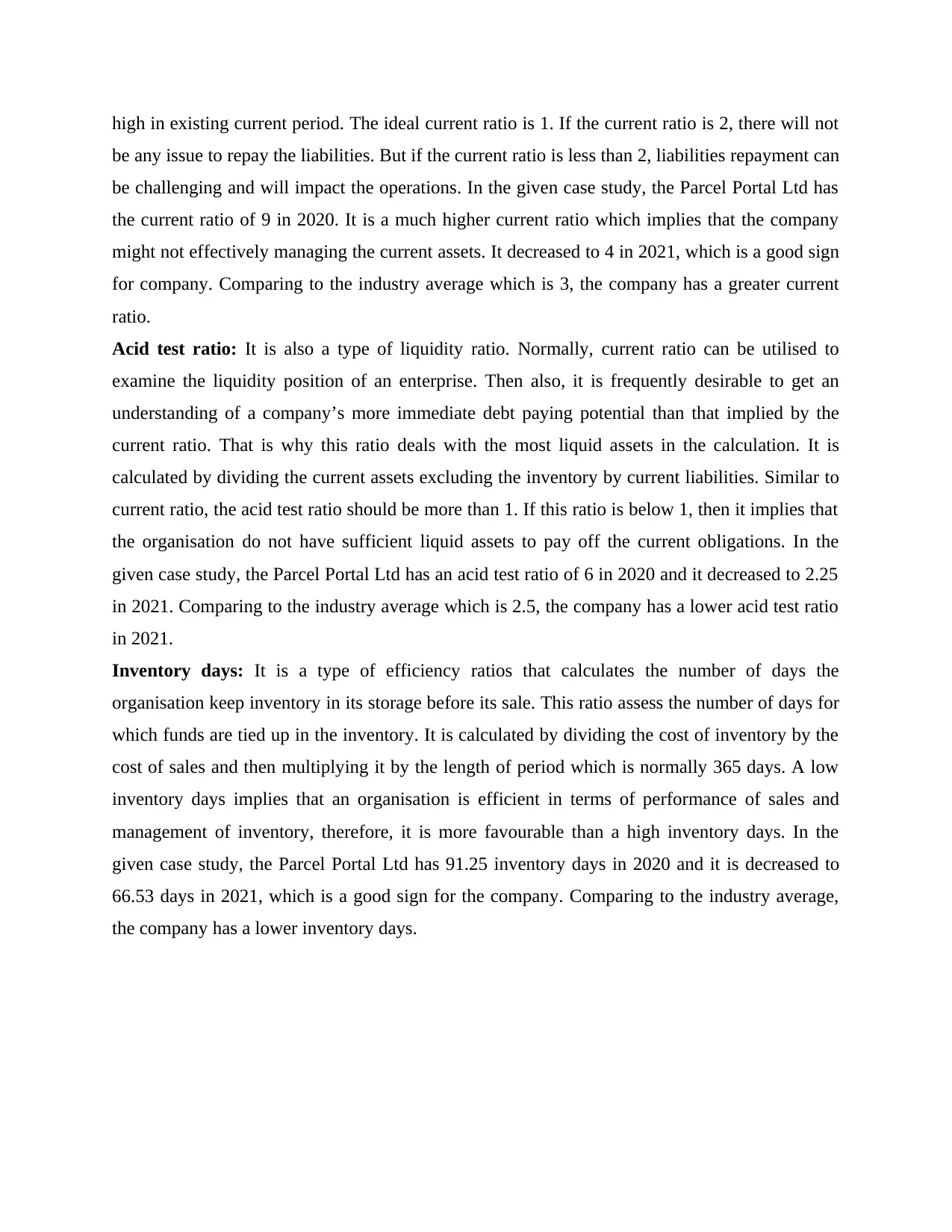
high in existing current period. The ideal current ratio is 1. If the current ratio is 2, there will not
be any issue to repay the liabilities. But if the current ratio is less than 2, liabilities repayment can
be challenging and will impact the operations. In the given case study, the Parcel Portal Ltd has
the current ratio of 9 in 2020. It is a much higher current ratio which implies that the company
might not effectively managing the current assets. It decreased to 4 in 2021, which is a good sign
for company. Comparing to the industry average which is 3, the company has a greater current
ratio.
Acid test ratio: It is also a type of liquidity ratio. Normally, current ratio can be utilised to
examine the liquidity position of an enterprise. Then also, it is frequently desirable to get an
understanding of a company’s more immediate debt paying potential than that implied by the
current ratio. That is why this ratio deals with the most liquid assets in the calculation. It is
calculated by dividing the current assets excluding the inventory by current liabilities. Similar to
current ratio, the acid test ratio should be more than 1. If this ratio is below 1, then it implies that
the organisation do not have sufficient liquid assets to pay off the current obligations. In the
given case study, the Parcel Portal Ltd has an acid test ratio of 6 in 2020 and it decreased to 2.25
in 2021. Comparing to the industry average which is 2.5, the company has a lower acid test ratio
in 2021.
Inventory days: It is a type of efficiency ratios that calculates the number of days the
organisation keep inventory in its storage before its sale. This ratio assess the number of days for
which funds are tied up in the inventory. It is calculated by dividing the cost of inventory by the
cost of sales and then multiplying it by the length of period which is normally 365 days. A low
inventory days implies that an organisation is efficient in terms of performance of sales and
management of inventory, therefore, it is more favourable than a high inventory days. In the
given case study, the Parcel Portal Ltd has 91.25 inventory days in 2020 and it is decreased to
66.53 days in 2021, which is a good sign for the company. Comparing to the industry average,
the company has a lower inventory days.
be any issue to repay the liabilities. But if the current ratio is less than 2, liabilities repayment can
be challenging and will impact the operations. In the given case study, the Parcel Portal Ltd has
the current ratio of 9 in 2020. It is a much higher current ratio which implies that the company
might not effectively managing the current assets. It decreased to 4 in 2021, which is a good sign
for company. Comparing to the industry average which is 3, the company has a greater current
ratio.
Acid test ratio: It is also a type of liquidity ratio. Normally, current ratio can be utilised to
examine the liquidity position of an enterprise. Then also, it is frequently desirable to get an
understanding of a company’s more immediate debt paying potential than that implied by the
current ratio. That is why this ratio deals with the most liquid assets in the calculation. It is
calculated by dividing the current assets excluding the inventory by current liabilities. Similar to
current ratio, the acid test ratio should be more than 1. If this ratio is below 1, then it implies that
the organisation do not have sufficient liquid assets to pay off the current obligations. In the
given case study, the Parcel Portal Ltd has an acid test ratio of 6 in 2020 and it decreased to 2.25
in 2021. Comparing to the industry average which is 2.5, the company has a lower acid test ratio
in 2021.
Inventory days: It is a type of efficiency ratios that calculates the number of days the
organisation keep inventory in its storage before its sale. This ratio assess the number of days for
which funds are tied up in the inventory. It is calculated by dividing the cost of inventory by the
cost of sales and then multiplying it by the length of period which is normally 365 days. A low
inventory days implies that an organisation is efficient in terms of performance of sales and
management of inventory, therefore, it is more favourable than a high inventory days. In the
given case study, the Parcel Portal Ltd has 91.25 inventory days in 2020 and it is decreased to
66.53 days in 2021, which is a good sign for the company. Comparing to the industry average,
the company has a lower inventory days.
Paraphrase This Document
Need a fresh take? Get an instant paraphrase of this document with our AI Paraphraser
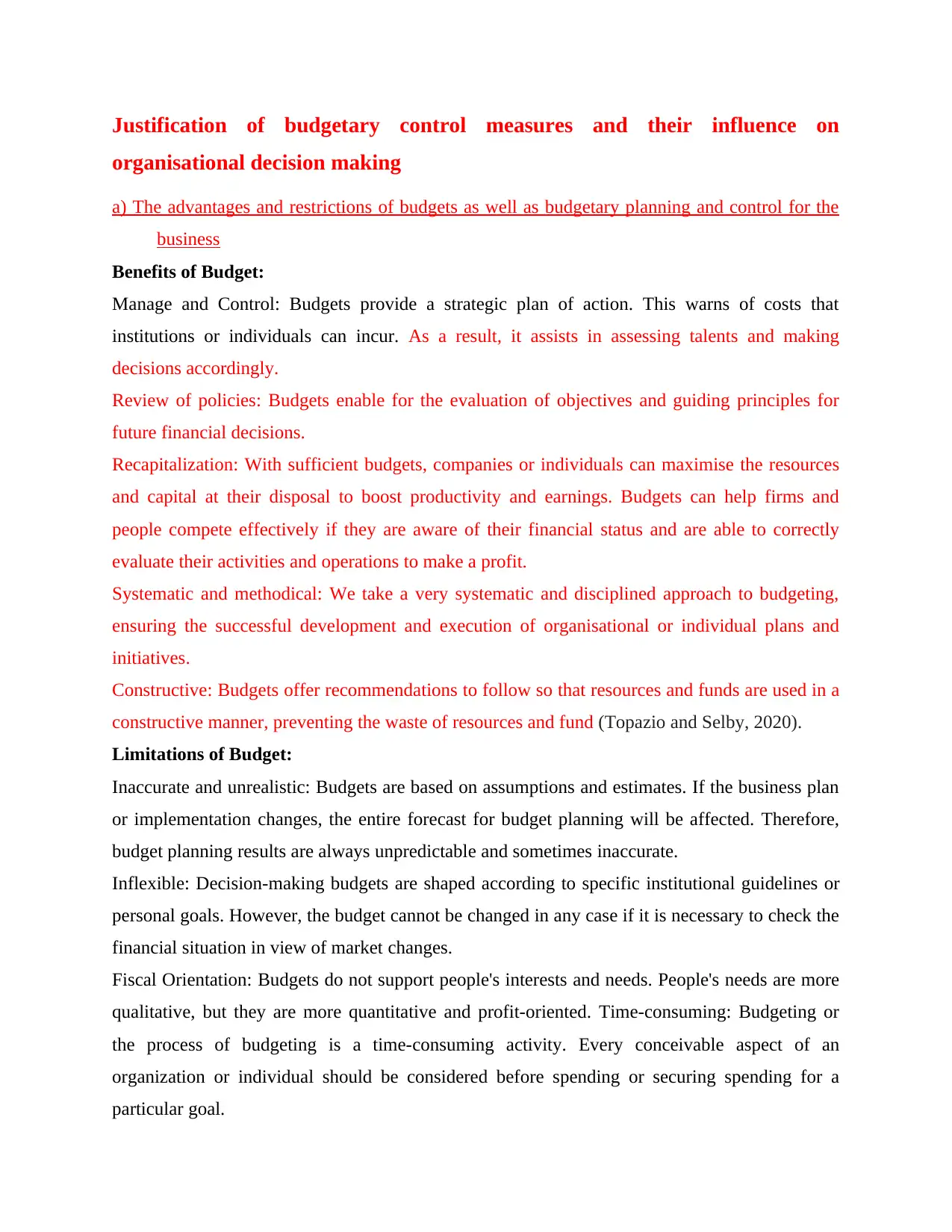
Justification of budgetary control measures and their influence on
organisational decision making
a) The advantages and restrictions of budgets as well as budgetary planning and control for the
business
Benefits of Budget:
Manage and Control: Budgets provide a strategic plan of action. This warns of costs that
institutions or individuals can incur. As a result, it assists in assessing talents and making
decisions accordingly.
Review of policies: Budgets enable for the evaluation of objectives and guiding principles for
future financial decisions.
Recapitalization: With sufficient budgets, companies or individuals can maximise the resources
and capital at their disposal to boost productivity and earnings. Budgets can help firms and
people compete effectively if they are aware of their financial status and are able to correctly
evaluate their activities and operations to make a profit.
Systematic and methodical: We take a very systematic and disciplined approach to budgeting,
ensuring the successful development and execution of organisational or individual plans and
initiatives.
Constructive: Budgets offer recommendations to follow so that resources and funds are used in a
constructive manner, preventing the waste of resources and fund (Topazio and Selby, 2020).
Limitations of Budget:
Inaccurate and unrealistic: Budgets are based on assumptions and estimates. If the business plan
or implementation changes, the entire forecast for budget planning will be affected. Therefore,
budget planning results are always unpredictable and sometimes inaccurate.
Inflexible: Decision-making budgets are shaped according to specific institutional guidelines or
personal goals. However, the budget cannot be changed in any case if it is necessary to check the
financial situation in view of market changes.
Fiscal Orientation: Budgets do not support people's interests and needs. People's needs are more
qualitative, but they are more quantitative and profit-oriented. Time-consuming: Budgeting or
the process of budgeting is a time-consuming activity. Every conceivable aspect of an
organization or individual should be considered before spending or securing spending for a
particular goal.
organisational decision making
a) The advantages and restrictions of budgets as well as budgetary planning and control for the
business
Benefits of Budget:
Manage and Control: Budgets provide a strategic plan of action. This warns of costs that
institutions or individuals can incur. As a result, it assists in assessing talents and making
decisions accordingly.
Review of policies: Budgets enable for the evaluation of objectives and guiding principles for
future financial decisions.
Recapitalization: With sufficient budgets, companies or individuals can maximise the resources
and capital at their disposal to boost productivity and earnings. Budgets can help firms and
people compete effectively if they are aware of their financial status and are able to correctly
evaluate their activities and operations to make a profit.
Systematic and methodical: We take a very systematic and disciplined approach to budgeting,
ensuring the successful development and execution of organisational or individual plans and
initiatives.
Constructive: Budgets offer recommendations to follow so that resources and funds are used in a
constructive manner, preventing the waste of resources and fund (Topazio and Selby, 2020).
Limitations of Budget:
Inaccurate and unrealistic: Budgets are based on assumptions and estimates. If the business plan
or implementation changes, the entire forecast for budget planning will be affected. Therefore,
budget planning results are always unpredictable and sometimes inaccurate.
Inflexible: Decision-making budgets are shaped according to specific institutional guidelines or
personal goals. However, the budget cannot be changed in any case if it is necessary to check the
financial situation in view of market changes.
Fiscal Orientation: Budgets do not support people's interests and needs. People's needs are more
qualitative, but they are more quantitative and profit-oriented. Time-consuming: Budgeting or
the process of budgeting is a time-consuming activity. Every conceivable aspect of an
organization or individual should be considered before spending or securing spending for a
particular goal.
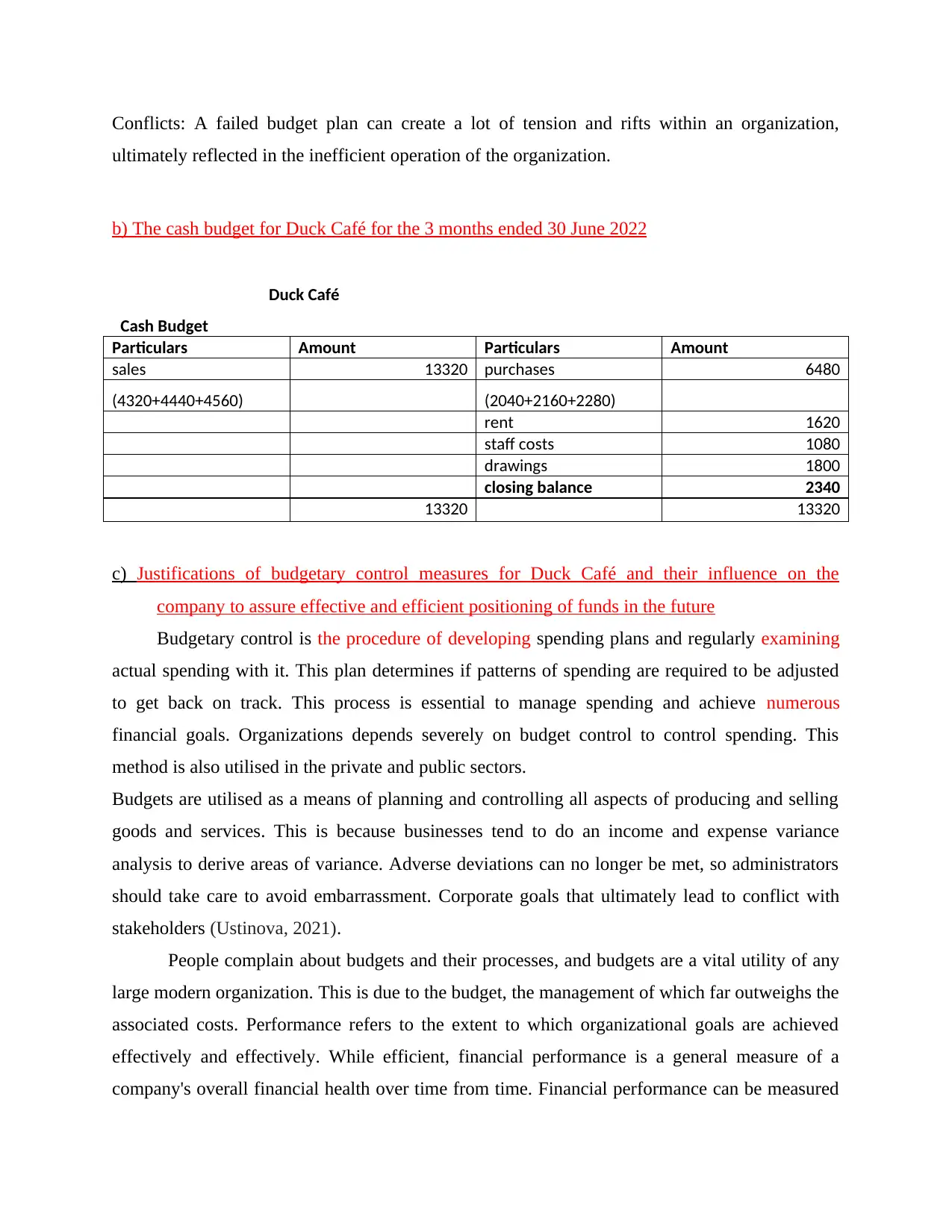
Conflicts: A failed budget plan can create a lot of tension and rifts within an organization,
ultimately reflected in the inefficient operation of the organization.
b) The cash budget for Duck Café for the 3 months ended 30 June 2022
Duck Café
Cash Budget
Particulars Amount Particulars Amount
sales 13320 purchases 6480
(4320+4440+4560) (2040+2160+2280)
rent 1620
staff costs 1080
drawings 1800
closing balance 2340
13320 13320
c) Justifications of budgetary control measures for Duck Café and their influence on the
company to assure effective and efficient positioning of funds in the future
Budgetary control is the procedure of developing spending plans and regularly examining
actual spending with it. This plan determines if patterns of spending are required to be adjusted
to get back on track. This process is essential to manage spending and achieve numerous
financial goals. Organizations depends severely on budget control to control spending. This
method is also utilised in the private and public sectors.
Budgets are utilised as a means of planning and controlling all aspects of producing and selling
goods and services. This is because businesses tend to do an income and expense variance
analysis to derive areas of variance. Adverse deviations can no longer be met, so administrators
should take care to avoid embarrassment. Corporate goals that ultimately lead to conflict with
stakeholders (Ustinova, 2021).
People complain about budgets and their processes, and budgets are a vital utility of any
large modern organization. This is due to the budget, the management of which far outweighs the
associated costs. Performance refers to the extent to which organizational goals are achieved
effectively and effectively. While efficient, financial performance is a general measure of a
company's overall financial health over time from time. Financial performance can be measured
ultimately reflected in the inefficient operation of the organization.
b) The cash budget for Duck Café for the 3 months ended 30 June 2022
Duck Café
Cash Budget
Particulars Amount Particulars Amount
sales 13320 purchases 6480
(4320+4440+4560) (2040+2160+2280)
rent 1620
staff costs 1080
drawings 1800
closing balance 2340
13320 13320
c) Justifications of budgetary control measures for Duck Café and their influence on the
company to assure effective and efficient positioning of funds in the future
Budgetary control is the procedure of developing spending plans and regularly examining
actual spending with it. This plan determines if patterns of spending are required to be adjusted
to get back on track. This process is essential to manage spending and achieve numerous
financial goals. Organizations depends severely on budget control to control spending. This
method is also utilised in the private and public sectors.
Budgets are utilised as a means of planning and controlling all aspects of producing and selling
goods and services. This is because businesses tend to do an income and expense variance
analysis to derive areas of variance. Adverse deviations can no longer be met, so administrators
should take care to avoid embarrassment. Corporate goals that ultimately lead to conflict with
stakeholders (Ustinova, 2021).
People complain about budgets and their processes, and budgets are a vital utility of any
large modern organization. This is due to the budget, the management of which far outweighs the
associated costs. Performance refers to the extent to which organizational goals are achieved
effectively and effectively. While efficient, financial performance is a general measure of a
company's overall financial health over time from time. Financial performance can be measured
⊘ This is a preview!⊘
Do you want full access?
Subscribe today to unlock all pages.

Trusted by 1+ million students worldwide
1 out of 14
Related Documents
Your All-in-One AI-Powered Toolkit for Academic Success.
+13062052269
info@desklib.com
Available 24*7 on WhatsApp / Email
![[object Object]](/_next/static/media/star-bottom.7253800d.svg)
Unlock your academic potential
Copyright © 2020–2026 A2Z Services. All Rights Reserved. Developed and managed by ZUCOL.




